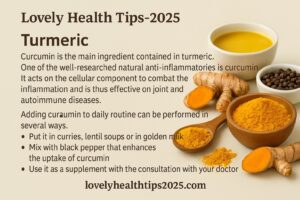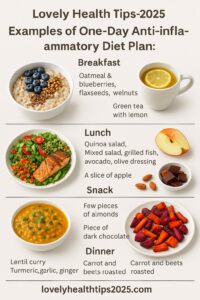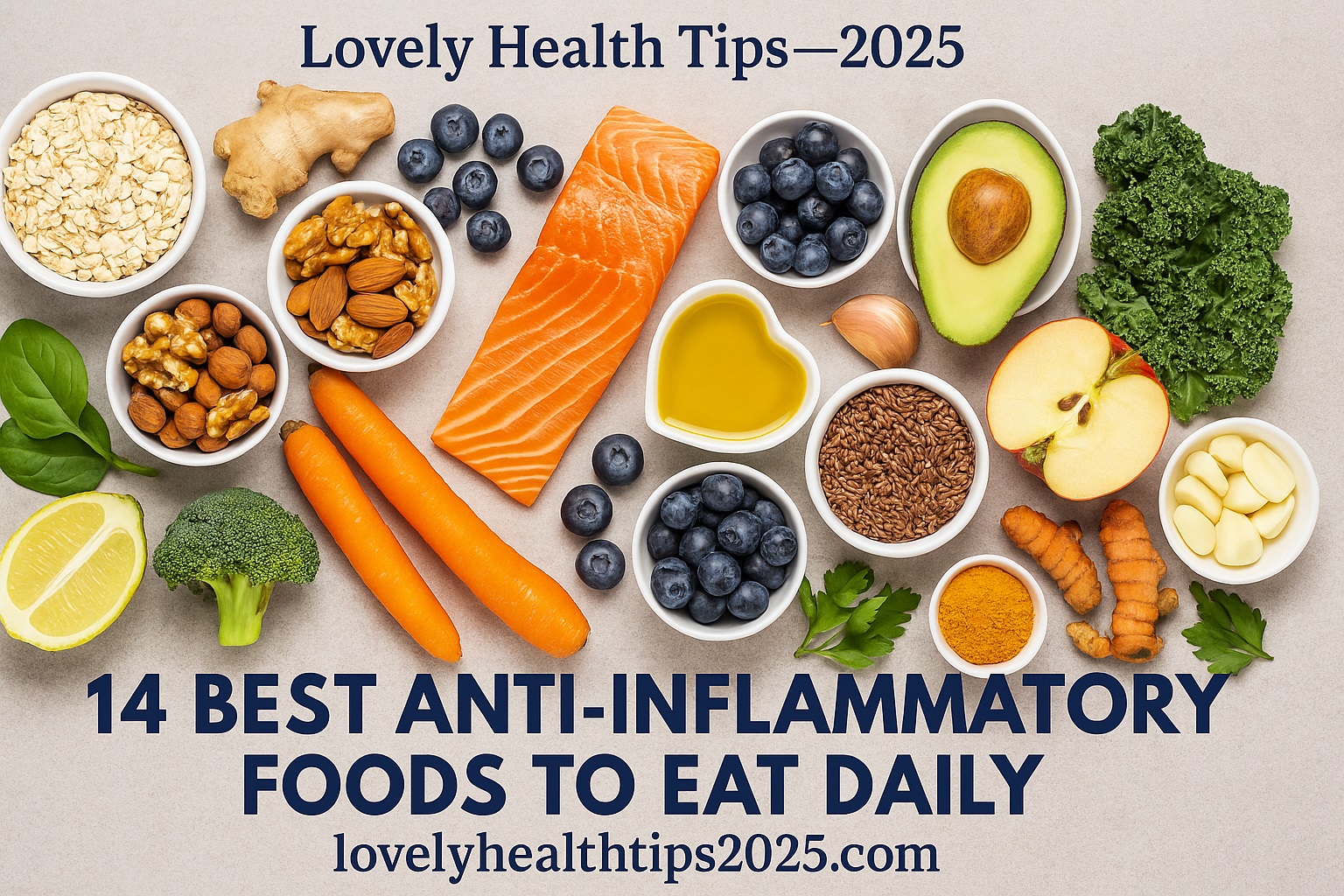Last Updated on October 21, 2025 by
Eat Well, Heal Deep: 14 Anti Inflammatory Foods to find Mind and Body Balance
Inflammation is a part of our natural immune reaction or infection, but chronic inflammation is a different type. When it goes chronic it silently leads to the development of other conditions like heart disease, diabetes, arthritis, asthma, depression and even cancer. Additional protection against chronic inflammation, one of the most potent weapons, is not located somewhere in the medicine list, but instead it can be found in our daily kitchen.
The anti inflammatory foods involve eating wholesome, nutrient-rich food items that alleviate inflammation levels, enhance the immune system and repair the overall health. In this article, we will be able to know the best anti inflammatory foods that we can consume on daily basis in order to feed our bodies and take care of personal health.
14 best Anti Inflammatory Foods:
1. Leafy Green Vegetables:
Examples: Dark colored vegetables like arugula, Spinach, mustard greens, collards green leaves etc. They are good in the salads, soups, smoothies and others.
Dark leafy vegetables are full of anti-oxidants, polyphenols, vitamin A, C & K and minerals such as magnesium. These are nutrients that aid in the manner by which the body deals with stress & inflammation. The fiber contained by these greens promotes healthy microbiome in the gut which supports the immune system.
How to take on daily basis:
- Add spinach or kale in your smoothie.
- Cook certain amount of green in olive oil and garlic as a complimentary dish.
- To make your salad base have pepper based flavor, add some little arugula to it.

2. Berries:
Examples include: Blueberries, raspberries, strawberries and blackberries.
Berries are concentrated in anthocyanins-super plant coloring materials, making them the beautiful bright fruits with anti-inflammatory effects. These are substances that can decrease the level of free radicals and restrain inflammatory substances such as CRP (C-reactive protein).
How to take berries on daily basis as Anti Inflammatory Foods
- Using of berries in our oatmeal or may be yogurt.
- During morning breakfast, we may use smoothie in the morning.
- It can also be used during snack time along-with some almonds.

3. Fatty Fish:
Salmon, mackerel, sardines, trout etc. are the examples of fatty fish.
Their main constituent, i.e., omega-3 fatty acids (EPA and DHA), reduce inflammation by interrupting pro-inflammatory substances (leukotriene and cytokines) released into the body.
The following are few ways through which we can consume these omega-3 daily:
- We may take the grilled & baked salmon — twice weekly
- Keep in canned sardines — salads or may be in the crackers.
- Omega 3-enriched in eggs, that we do not get from fish.

4. Extra Virgin Olive Oil:
Extra virgin olive oil (EVOO) is a table staple of Mediterranean culture and has oleocanthal in them, which is similar to ibuprofen and inhibits inflammation.
One of the ways of incorporating EVOO into your life on a daily basis is
- It may be used as the most primary oil during our cooking of meals
- Drizzle on the green colour salad
- Roasted vegetables or soup or to combine it with some herbs to create a dip.

5. Garlic and Onions:
Both garlic and onions have similar compounds like sulfur, flavonoid, and other elements, which help in decreasing inflammation and enhancing the immune system. Allicin and quercetin which are present in garlic and onions respectively are highly potent antioxidants.
In order to receive these benefits on daily basis Anti Inflammatory Foods
- Stir-fries, soups and sauces should include chopped garlic and onions.
- Roasting Whole cloves, spread on olive oil will also give a mild sweet flavor.
- It can be used in fresh salads.

6. Green Tea:
Green tea does not only calm. It contains large amounts of epigallocatechin-3-gallate (EGCG) which is a powerful antioxidant that preserves inflammatory processes in the body.
How to consume on day-to-day basis Anti Inflammatory Foods
- Consume 1 up to 2 cups at intervals.
- As a foundation of smoothies, you can use green tea.
- To drink something cool, boil some iced green tea with lemon and mint.

7. Colorful Vegetables:
There are numerous benefits in colored vegetables whose common examples include carrots, beets, sweet potatoes, and bell pepper. Other nutrients like Phyto nutrition- including beta-carotene, lutein, and zeaxanthin are abundant in them and neutralize free radicals that cause inflammation. They also contain a lot of fiber hence maintain the goodness of the gut.
To make your food look any more colorful, do the following as Anti Inflammatory Foods
- Different types of vegetables may be boiled using the olive oil & herbs.
- Grate the carrots and beets in the salads.
- To come up with delicious appetizing side dish to accompany sweet potato is cooking steam or mashed sweet potato.

8. Nuts and Seeds:
Such types includes — Almonds, walnuts, flaxseeds & chia seeds etc.
These nutritional nuggets (nuts and seeds) provide you with healthy fat, plant protein, magnesium and antioxidants. A very good source of omega-3 is flaxseeds and walnuts, which is plant-derived alpha-linolenic acid (ALA).
What to incorporate on the daily basis:
- Take a spoon of chia in the morning when you have yogurt or smoothie.
- Raw nuts: a little handful.
- Take nut butters (one of a kind, almond or walnut) on whole-grain toast.

9. Apples:
A day a day an apple may keep the doctor away. Apples have quercetin which is a natural, anti-inflammatory, antihistamine flavonoid. Apples are also beneficial to the health of the gut since they contain a lot of fiber, particularly pectin.
Eating an apple a day is not really that difficult:
- Snack on an uncooked apple or place nut butter on top of it.
- Cut a piece of an apple in oats or overnight oats.
- Make a flavorful dessert by baking an apple together with cinnamon.

10. Dark Chocolate:
Flavonoids found in dark chocolate have the ability to reduce inflammation and the condition of vascular health. One should consume it in limited quantities and select the ones that do not contain large quantities of added sugar.
- At the end of the meal take a piece of a small square.
- Chocolate having Yogurt or smoothies may be shavings on the top.
- At home make a trail mix of some nuts and dark chocolate chips.

11. Citrus Fruits:
The citrus fruits has vitamin-C, which acts as an antioxidant & boosts the immune system to reduce the inflammation. They are as well rich in flavonoids which assist in the control of inflammatory enzymes.
There are three avenues of consuming the citrus on a daily basis:
- Add lemon or lime into the water.
- We may take orange or grapefruit during snack time.
- Citrus zest should be put on different salads.

12. Ginger:
Ginger contains gingerol that is an anti-inflammatory and an antioxidant. It can assist in alleviating the pain in the joints, soreness of muscles as well as inflammation of the digestive system.
Ginger may be used in our day-to-day life as mentioned below:
- Prepare Honey and lemon fresh ginger tea.
- Fresh ginger may be grated into soups, stews or stir fry dishes.
- Powdered type ginger can be used in the smoothies or bakery.

13. Turmeric:
Curcumin is the main ingredient contained in turmeric. One of the well-researched natural anti-inflammatories is Curcumin. It acts on the cellular component to combat the inflammation and is thus effective on joint and autoimmune diseases.
Adding curcumin to daily routine can be performed in several ways.
- Put it in curries, lentil soups or in golden milk
- Mix with black pepper that enhances the uptake of curcumin
- Use it as a supplement with the consultation with your doctor

14. Whole Grains:
Examples: Quinoa, brown rice, oats, barley Whole grains provide us with fibers, B vitamins and minerals. These nutrients will lower the levels of inflammation and control blood sugar levels. The opposite can be achieved by refined grains.
The methods of including them to everyday eating:
- Eat oatmeal or multi grain porridge at the beginning of the day.
- Grain bowls made of brown rice or quinoa may be taken on daily basis.
- Instead of using plain flour use whole wheat or millet.

Some foods may be reduced to eat:
When we have started to take the anti-inflammatory foods, we should reduce the foods which lead to inflammation. Following are the some suggestions to avoid such foods:
- Sugar beverages
- Trans fats and hydrogenated oil
- Processed Eggs (E.g. Sausage or bacon)
- Refined carbs (white bread or pastry and so on)
- Over drinking Synthetics and food preservatives
- The foods are capable of creating inflammation in the body.

Breakfast-
- Oatmeal, blueberries, flaxseeds & walnuts etc.
- Green tea and lemon tea may be added
Lunch-
- Quinoa salad Mixed salad, grilled fish, Avocado, olive dressing
- An apple
Snack-
- Few pieces of almonds
- Piece of dark chocolate
Dinner-
- Lentil curry Turmeric, garlic and ginger
- Carrot and beets roasted
- Ginger tea Herbal

Concluded remarks: Food as follow up medicine
Most of the modern diseases are caused by chronic inflammation and this condition shouldn’t dominate our life. Adjusting our diet to include anti inflammatory foods in the regular menu & to allow our body to heal, regenerate and remain energized.
The best way of starting is by starting small, by replacing the cooking oil with olive oil, adding green vegetables in our smoothie or using turmeric in our soups. Those are small steps but in the long run, they can make a great change. Food is not just a fuel, food is also as medicine.
Reference from Harvard Health : Foods that fight inflammation – Harvard Health
Thanks and Regards.
About the Author – “Mr. Bibhu Ranjan Mund”, Master in Public Health (MPH) from IIHMR University, Jaipur (Rajasthan) has experience of 18 years in Public Health activities. Through “Lovely Health Tips-2025”, we share the evidence & experienced based health & wellness guides with solutions for every day well-being. More from Author
Disclaimer
This information is suggestive only and not a replacement for medical advice. For more detail, please visit to my website as mentioned below:

